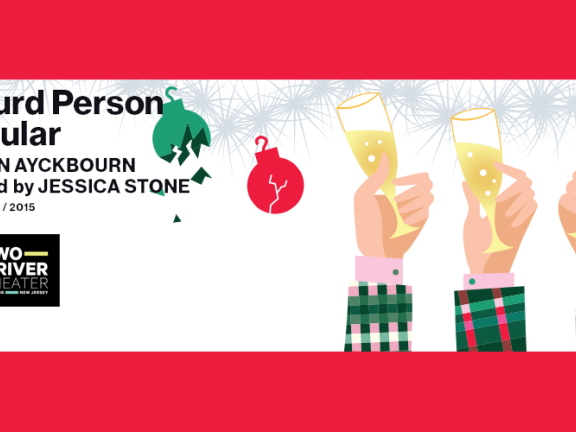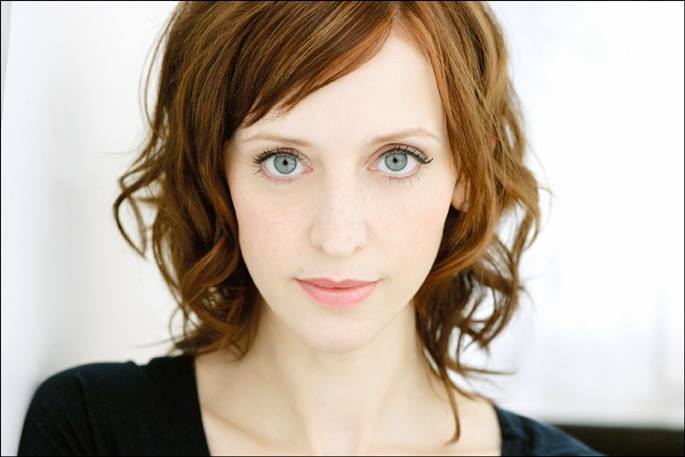Actress Jessica Stone Takes on the Role of Director for "Absurd Person Singular" at Two River Theater

As a Broadway actress alone, Jessica Stone has compiled quite the resume.
She made her debut as Frenchy in the 1994 revival of “Grease.” A decade later, she acted opposite Nathan Lane and Matthew Broderick in an update of “The Odd Couple.” And three years ago, she starred opposite Sutton Foster in the Tony-winning revival of “Anything Goes.”
New Jersey audiences may also remember her performances in “June Moon” and “She Stoops To Conquer” at McCarter Theatre in Princeton.
But a few years ago, Stone began bolstering her career with a parallel job: as a director. And her latest project brings her back to the Garden State.
Stone directs a new version of Alan Ayckbourn’s classic 1972 play “Absurd Person Singular” that will run at Two River Theater in Red Bank from Jan. 10 to Feb. 1.
The show — one of the most famous of the 78 written by Ayckbourn, a celebrated English playwright — follows three British couples over the course of three Christmas parties three straight years, examining how they cope with marriage and class along the way.
The cast includes a bevy of stage vets: Brooks Ashmanskas, Mary Birdsong, Michael Cumpsty, Scott Drummond, Liz Wisan and Melissa Van Der Schyff.

Jessica Stone
For Stone, this is the sixth show the native of Rochester, N.Y., has directed — and the first she’s helmed in New Jersey.
Jersey Arts spoke with Stone about how her acting background has boosted her directing chops, why the play continues to charm audiences four decades later, and how Two River is one of the many examples of how New York is hardly the only place to see theater in the area.
Jersey Arts: How did you come to work at Two River?
Jessica Stone: (Two River Artistic Director) John Dias and I have many mutual friends. We had been in conversations for a while about ways to get over there. We finally sort of happened upon the idea for this play. That set everything in motion.
JA: Why this play?
JS: John had his eye on it for a while. He loves Ayckbourn, and he was considering it for the season. We were going over a couple of plays. I knew it, but I hadn’t read it in ages. Then I read it again, and I fell in love with it.
JA: Why do you think the play still resonates with audiences 40 years after it was written?
JS: There are plays that are significantly older that still resonate. I think the thing that resonates is: It’s an idea of what happens when a certain kind of man achieves a certain kind of power and status. The English class system is a very big art of their culture. I have a friend over there who says that by hearing a certain kind of accent, you know how that person spends Christmas morning. Class is an important distinction for them. It’s interesting to see how these different couples shift over the course of three years — how they respond to each other as a result of their success or failure or inertia.
JA: And it’s not just the English. Success and failure and inertia are things most anyone can relate to.
JS: Alan Ayckbourn is one of our finest contemporary playwrights. His exploration of quirks in humanity resonate for everybody. He’s a really, really funny man. His writing is very funny. When you go to a comedy and see the human experience on display, one recognizes oneself in the meanness or any sort of scenario. If you’re able to laugh at it, that’s really appealing.
JA: What inspired you to get into acting?
JS: When I was a little girl, my father took me to see everything—plays and musicals, concerts, operas, ballet. Silly stuff and serious stuff and mainstream stuff and avant-garde stuff. I was immersed in it at a really young age. I knew from a very young age — age 7 — that it was something I wanted to do. I started taking classes and performing in community theater, even some professional things. My dad lived in New York City, and I spent my summers in New York. That’s when he took me to see everything.
JA: So why the move to the director’s chair?
JS: I think always as an actor, I’m very interested in more parts of the story than just my part. I was always very interested in larger themes, not just on my character’s journey. Over the years, in my downtime between acting jobs, I’ve assisted many directors who were friends. I realized I really enjoyed that piece of the puzzle.
It just so happens that in the last four years, when my directing began in earnest, the directing jobs have just beat the acting jobs to the punch. I’m getting more offers for directing. I’m not giving up acting, but I do really enjoy collaborating with designers and actors. I really enjoy having that impact on an evening.
JA: Does your experience as an actor inspire your directing?
JS: A good friend of mine, Joe Mantello — a really wonderful director who also started as an actor — said, you’ll find that you step three feet across the other side of the table during a rehearsal, and suddenly the clouds part and it becomes very clear what has to happen. The thing that’s interesting is, you can remind yourself when you’re acting that it can be that easy. And when you’re directing, it is actually that hard. I do understand how nonlinear a process it is for an actor. Certainly, every person has a different process. I do think it can help in terms of communicating during the rehearsal process — understanding that process.
But I have an Achilles heel—sometimes, I know myself, if a director doesn’t come from the world of acting and just has expectations, priorities, and points of view, that gets another kind of result that is also satisfying. I don’t think it makes me a better director to have been an actor. It makes me a certain kind of director.
JA: Do you ever worry that there is a view in this area that only great theater exists in New York and places like Two River and McCarter an hour or so across the river sometimes get overlooked?
JS: I hope not. I think regional theater is just as important as an expensive Broadway production. There are all kinds of resources that one can get by being in New York in terms of money and a certain kind of talent pool that doesn’t want to leave New York. But regional theaters all across country, they are on the front lines in terms of keeping the public interested in art form that’s thousands of years old.
It’s very different than film, when you sit in a theater and let a visual medium wash over you. Theater is about language. It takes work sitting in theater, sitting in a play. I do believe that live theater is an incredible part of our culture. Kids in Red Bank and Scranton and Albuquerque, I want them to be exposed to it so they have a thirst for it and continue to go and have their worlds rocked by it. It’s an art form that’s incredibly important.
JA: Stephen Sondheim once said that one of the shocking things about his hit 1970 musical “Company” was that many audience members came to the theater to escape their lives and wound up seeing a show about the struggles of marriage. Do you think there’s a similar feeling in this show?
JS: This isn’t just cotton candy. It’s definitely funny, but it portrays people sometimes being cruel to each other on purpose, or being cruel to each other without realizing it, or how sometimes when you’re trying to be nice, it’s such a misfire that ends up being cruel. I don’t know one person who goes to theater to escape. It’s a vibrant experience that takes you out of life. But a person who goes to the theater and doesn’t want to think, I don’t know that person. If you don’t want to think, turn on the TV and watch “The Bachelor.” Even “Top Chef” makes you think a little. But I don’t think people go to the theater not to think.
JA: What’s next for you?
JS: Next I’m going to direct George Bernard Shaw’s “Arms and the Man” at the Old Globe in San Diego.
Alan Ayckbourn’s “Absurd Person Singular” opens January 10, 2015 and runs through February 1, 2015 at Two River Theater, 21 Bridge Avenue, Red Bank, NJ 07701. For tickets or more information, please call (732) 345-1400 or visit www.tworivertheater.org.
